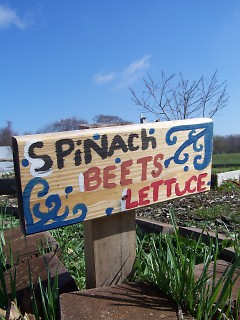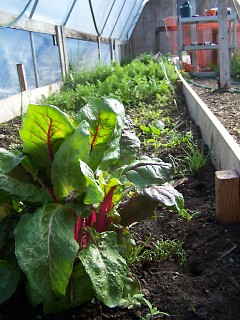AJ Tipton, a high school senior at the West Michigan Academy of Environmental Science, didn't realize how much of an impact genetically modified organisms (GMOs) had on his life until about a year ago, when his AP environmental science teacher had the class watch the PBS documentary, Harvest of Fear: Exploring the Growing Fight Over Genetically Modified Food.
“When I watched 'Harvest of Fear,' it surprised me,” said Tipton. “It gave me a whole different perspective on food. I started thinking about our food system, about our food's big picture – from seed to table.” That first exploration in the classroom launched Tipton into a deep dive, researching GMOs.
Tipton's research project on GMOs embodies the West Michigan Academy for Environmental Science's philosophy: it's a preK-12 charter school in the City of Grand Rapids with a learning lab of 62 acres on which students can explore and learn about the natural world and sciences.
Holly Orions, environmental educator at WMAES speaks enthusiastically about the school's philosophy, “Our students learn from the ground up!” She attests to the value of Tipton's study of GMOs, “It is important that students know about the place where they live, and WMAES allows them that opportunity.”
Tipton gives credit to his teachers and school for the inspiration and desire to learn more – not only about GMOs – but about the natural world around him. “Before I moved to Grand Rapids and began WMAES as a sophomore, I was in a school where we never got outside – the classroom was boring. At WMAES, learning is hands-on, and fun.”
Orions agrees. “Environmental science education increases student engagement in science, improves student achievement in core areas, provides students with everyday tools for the 21st century, AND it allows students to enjoy the outdoors while learning about the environment first hand.”
“My senior project helped me understand the environmental, social, and political impact GMOs, and I learned quickly that it was a lot more than just some genetically modified tomatoes. I was surprised how GMOs are in many things we use day-to-day,” explains Tipton.
As part of the research for his thesis, “OMG! GMOs!: A Look at Genetically Modified Food,” Tipton interviewed April Dávila, author of an online, reality-blog, “A Month Without Monsanto.” In her blog, Dávila reported out about her month-long adventure, detailing her attempts to avoid products and food that had been created by the science of corporate, bio-tech giant, Monsanto. At the outset of her journey, Dávila declares in her blog, “I began to ponder whether it is even possible to live a modern, American life outside the grasp of Monsanto.”
Dávila's hypothesis resonated with Tipton, “GMOs are in everything you do. Look at Dávila's 'Month Without Monsanto,' she had to not only change what she ate every day, but she also had to change the clothing she wore. To get GMOs out of your life, you have to change your life.”
Tipton then refers to Dávila's lists of products and foods she used during her month without Monsanto (Patagonia clothing, certified organic foods). He points out that adjustments Dávila had to make in her month of blogging are similar to those changes Tipton is incorporating into his own life.
“I don't go to Wal-Mart anymore - I am concerned with the role of chain stores in the system. I try to shop at the smaller, local stores. It matters to try to trace where the money goes,” Tipton says, mindfully. “And with friends, we don't eat out at restaurants as much. When I discuss GMOs with them [my friends], they have no idea -they freak out, they don't understand. But I try to help them understand.”
When asked about his family's response to his research, Tipton laughs, “My dad calls me a hippy.” But that doesn't phase Tipton. “Before I had this class, I had no idea about GMOs. So, I try to get my Dad to understand that there are changes we need to make at home – making dinner from scratch instead of pizza rolls or tv dinners. Growing our own food from organic seed would be best. I am working on it.”
At the encouragement of Orions, Tipton is taking his project online as a blog. Newly launched, his blog site, “OMG: GMOs” will help Tipton share his food systems and GMO concerns with people his own age and connect with others who are interested in the same issue.
And although Tipton sees the value of connecting to other young people with his blog, he feels that schools like WMAES that make a greater difference in the life of young people, “If a kid doesn't know what exists in the natural world, they will never be interested.”
For a snapshot of WMAES' programs in action, check out their YouTube channel: http://www.youtube.com/wmaes62
Disclosure: Lisa Rose Starner is a Grand Rapidian and has worked in the area of food and community in Grand Rapids for nearly a decade. This is the first of many food-related articles for her new series in the Rapidian, The Local Beet. An avid gardener and cook, Lisa grows vegetables and herbs with her family on Grand Rapids' West Side. Beyond holding a degree in anthropology and a Masters in Public Administration; Lisa is currently a student of Great Lakes herbalist, Jim McDonald. She is enjoying her newest hyper-local food adventure as a backyard herbalist.
The Rapidian, a program of the 501(c)3 nonprofit Community Media Center, relies on the community’s support to help cover the cost of training reporters and publishing content.
We need your help.
If each of our readers and content creators who values this community platform help support its creation and maintenance, The Rapidian can continue to educate and facilitate a conversation around issues for years to come.
Please support The Rapidian and make a contribution today.




Comments
The link to my blog is actually http://62acrewood.blogspot.com
I changed it ;)
Thanks, AJ, for your work. We look forward to seeing your insights and how your advocacy unfolds.